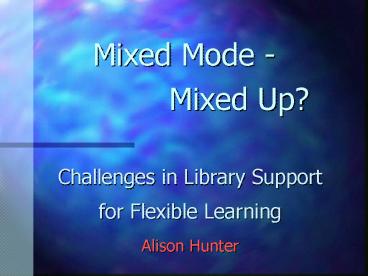Mixed Mode Mixed Up - PowerPoint PPT Presentation
1 / 15
Title:
Mixed Mode Mixed Up
Description:
Off-site, personal tutorial contact (personal, tele-/video- conferencing) ... ( ie encouraging those with to do-it-yourself) Different type of service for ... – PowerPoint PPT presentation
Number of Views:20
Avg rating:3.0/5.0
Title: Mixed Mode Mixed Up
1
Mixed Mode - Mixed Up?
- Challenges in Library Support for Flexible
Learning - Alison Hunter
2
Students want
- Location independence
- Time independence
- Flexibility in course choice
- Assessment choice
- Instant response (ie Internet time)
- Alison Hunter, University of Southern Queensland,
Australia
3
Choice and mixture of learning modes
- On-site - full-time traditional day
- On-site - part-time or night/weekend)
- Off-site, personal tutorial contact (personal,
tele-/video- conferencing) - Distance correspondence
- Online, little or no direct physical contact
- All of the above, at various times or
- all at once..
4
USQ a multimodal University
5
Styles of learning teaching
- Traditional text and lecture based
- Internet/online vs book-based
- Team/project/ problem-based learning
- Multimedia/visual vs text vs oral etc
- Training vs learning both at once?
- Deep learning and reflection
6
Funding modes and choices
- HECS - ie government supported
- Full fee -
- undergrad
- post-graduate
- Value-added - core payment and fees for
additional services
7
The result? Simultaneous Multi-modal study
- Students move flexibly from one mode to another,
or study simultaneously in multiple modes - Especially in on-campus/off-campus/online
- Across time and location
- On-campus
- Online Off-campus
8
Librarys involvement in the problem
- Resources in print, CD-ROM, microfilm, electronic
online formats - Multiplicity of interfaces, forms of
authentication - Multiple points of access
- Document supply restrictions
- Funding problems restricting services
- Service models based on traditional modes
- (eg face-to-face and distance ed.)
9
Library Responses
- It should be no longer sustainable for the
library to differentiate its services to
particular discrete groups of students - because -
- they are no longer discrete groups.
10
Library Responses
- Policies on lending, services that do not
discriminate, enable modal movement by students - Promote integration of off-campus, on-campus and
online services in library structure and
processes - Authentication as urgent priority
- Single sign-on
- Easy processes, help for remote users in many
ways - Institutional funding that recognises
- Continuing critical role of information resources
in learning - Flexible models based on service outcomes (esp
for international and online students)
11
Service Responses
- Portals to promote simplicity
- Better learning pathways for info literacy
- consistent approach
- Modular, small chunks, able to be standalone or
integrated into academic content - generic skills-based
- eg. eGO (USQ) Pilot (USQ)
- Modal indifference for service by staff, via
training, and flexible response - Interlibrary loan processing eg LIDDA
- (aim to improve service response to on-campus
levels?)
12
Reference responses Personal service and
presence. Virtual/automated reference
- Synchronous One-on-one chat
- Tools becoming available (eg HumanClick
(http//www.humanclick.com) LivePerson
(http//www.liveperson.com) - Good for quick service, eg IT help
- Asynchronous Virtual reference desk (email,
web-based) - Good for all-hours reference service, if global
24 hour coverage not possible - Useful for serving geographically distant library
customers - For users who may be unable physically or
unwilling to approach a librarian in person - Automated, context-sensitive creation and
presentation of frequently asked ( updated!)
reference questions (FAQs) - Guided tutorials (e.g., database searching,
learning and using applications)
13
Reference responsesPersonal Information
Gathering Sorting
- Customized current awareness services organised
with suppliers eg IDEAL - Automatic, customized searching (cooperation with
other subject-expert agents) - Personal newspapers and Web sites (e.g.,
MyYahoo!) - Customized search engines and filters (eg Endnote
connect files enabling personal info management)
- E-mail filtering and sorting programs
- Custom recommendations of sites/items of interest
- (Zick, Laura (2000) The Work of Information
Mediators A Comparison of Librarians and
Intelligent Software Agents First Monday, volume
5, number 5 (May 2000), - URL http//firstmonday.org/issues/issue5_5/z
ick/index.html )
14
Service ResponsesMediation between searcher and
information
- Role of subject searches (for remote users)
- Different type of service for those without
Internet access? (ie encouraging those with to
do-it-yourself) - Different type of service for research students?
- Delivery mechanisms changing (email, Internet
fax, etc) - changing service levels? - Value added service (chargeable?)
- Current awareness services for students? (part of
portal services?) - Alison Hunter, University of Southern Queensland,
Australia
15
CONCLUSION
- Our users are demanding flexibility in formats,
services, responses - We need to be relaxed, understand their needs and
go the distance to meet them. - Alison Hunter, University of Southern Queensland,
Australia
























![Low-Latency Interfaces for Mixed-Timing Domains [in DAC-01] PowerPoint PPT Presentation](https://s3.amazonaws.com/images.powershow.com/A1256656605baPBE.th0.jpg?_=20151201094)






